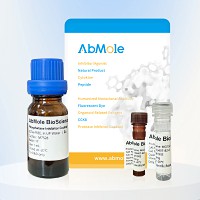All AbMole products are for research use only, cannot be used for human consumption.

In vitro: Adalimumab blocks the interaction of TNF with the p55 and p75 cell surface TNF receptors, thereby neutralising the activity of this cytokine. Through its anti-TNF actions, adalimumab reduces concentrations of matrix metalloproteases (MMP-1 and -3) and other markers of cartilage and synovium turnover, reduces of matrix metalloproteases (MMP-1 and -3) and other markers of cartilage and synovium turnover, and reduces concentrations of acute phase reactants of inflammation (C-reactive protein [CRP] and erythrocyte sedimentation rate [ESR]) and serum cytokines (IL-1β mRNA, IL-1 receptor antagonist, IL-6).
In vivo: Adalimumab is safe and well tolerated. In healthy adults, the average absolute bioavailability of adalimumab 40 mg administered subcutaneously (s.c.) is 64%. Concentrations in the synovial fluid are 31-96% of those of the serum. Maximum plasma concentrations occur at 131 (± 56) h, and the mean half-life is ∼ 2 weeks (range, 10-20 days). Adalimumab treatment attenuates the Ovalbumin(OVA)-induced increase in serum IgE, TH2 and TH1 derived inflammatory cytokines (IL-4 and IFN-γ, respectively) in bronchoalveolar lavage (BAL) fluid, suppresses recruitment of inflammatory cells in BAL fluid and lung, and inhibits BAL fluid neutrophilia. It also ameliorates goblet cell metaplasia and bronchial fibrosis.
| Cell Experiment | |
|---|---|
| Cell lines | Caco-2 BBE cells |
| Preparation method | T-84 and Caco-2 cells grown on transwell inserts were primed with IFN-γ (2.5 and 5 ng/ml, respectively) for 24 h followed by treatment with TNF-α (5 ng/ml), adalimumab (10 μg/ ml), or both. |
| Concentrations | 10 μg/ ml |
| Incubation time | 24 h |
| Animal Experiment | |
|---|---|
| Animal models | CD1 mice |
| Formulation | PBS |
| Dosages | 1 ml/100 g b.wt |
| Administration | i.p. |
| CAS Number | 331731-18-1 |
| Storage | Store at -20°C or -70°C. Avoid multiple freeze-thaws. |
| Related TNF Receptor Products |
|---|
| Ozekibart
Ozekibart is an anti-TNFRSF10B monoclonal antibody. |
| TAPI-0
TAPI-0 is a TACE (TNF-α converting enzyme; ADAM17) inhibitor with an IC50 of 100 nM. |
| Semapimod tetrahydrochloride
Semapimod tetrahydrochloride (CNI-1493), an inhibitor of proinflammatory cytokine production, can inhibit TNF-α, IL-1β, and IL-6. |
| BMS-566394
BMS-566394 is a potent, exceptionally selective inhibitor of TNF-α converting enzyme (TACE). |
| APVO603
APVO603 is a dual agonist bispecific antibody employing a novel mechanism of action to simultaneously target 4-1BB (CD137) and OX40 (CD134), both members of the TNF-receptor family. |
All AbMole products are for research use only, cannot be used for human consumption or veterinary use. We do not provide products or services to individuals. Please comply with the intended use and do not use AbMole products for any other purpose.


Products are for research use only. Not for human use. We do not sell to patients.
© Copyright 2010-2024 AbMole BioScience. All Rights Reserved.
